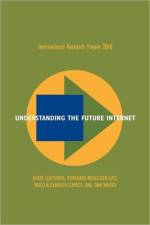- The End of Business as Usual
av C Thomas, Mulholland & Kurchina
377
Mashup Corporations: The End of Business As Usual tells the tale of Vorpal Inc., a company that pioneers the implementation of service-oriented architecture to transform its business model. CEO Jane Moneymaker believes in marketing manager Hugo Wunderkind's idea of creating a new market using non-traditional methods based on mashups, but struggles to achieve this vision. The story illustrates what it takes to achieve cultural change, overturning established business and IT structures. By embracing a service-oriented approach Moneymaker makes Vorpal faster, flexible and more responsive, bringing an end to business as usual. Mashup Corporations takes a unique approach to communicating its message. From the first page, readers will find themselves in a story populated with people who interact in ways that will ring true to others who have struggled to make technology work in an organization, large or small. The conflicts that naturally arise between CEOs, CIOs, and line of business managers illustrate the important issues at stake within Vorpal and most other companies. As the leaders of Vorpal find their way out of their predicament, rules about how mashups and service orientation can be properly applied emerge. These rules, which may be the most enduring contribution of the book, are illustrated and analyzed using real-life examples. Introduction to the Second Edition Since the publication of the first edition of Mashup Corporations: The End of Business as Usual in October 2006, the adoption of business models related to mashups, Web 2.0, and service oriented architecture (SOA) has continued to accelerate. New applications, new products, new techniques, and, most importantly, new ideas are blooming. The authors are pleased to report that the first edition of the book has met with a warm reception. Forrester, the analyst firm, recommended it as one of the two most entertaining and informative books on the subject. The book has been adopted by several different companies as an educational tool. Capgemini created a live-action play based on characters in the book that was presented at Oracle Open World during a keynote address by Andy Mulholland. (See http: //www. oracle.com/openworld/attendees/program-overview/keynotes.html to view the video, which appears about half way down the page. A condensed version is also available on www.capgemini.com.) Sales of the book have been brisk and so have suggestions for improvements. Based on this success, the authors decided it was time for a second edition. What We Added You will find two additional chapters in this second edition: "Chapter 7: Overcoming Barriers" and "Chapter 9: Changing the Game". The idea for chapter 7 came out of discussions between the authors and Avrami Tzur, VP of SOA at Hewlett Packard. Avrami pointed out that even though the story of the book covered the process of adopting mashups and SOA from top to bottom, a different sort of struggle emerged as the early adopters in a company attempted to convince the rest of the company to come along. Based on Avrami's experience, we added a chapter that covers the struggle to overcome barriers to adoption of mashups and SOA. Anyone who knows Andy Mulholland is well aware of his prodigious output in the form of blogs, white papers, and of course, books. Andy's analysis of how to think about mashups, SOA, and Web 2.0 in an integrated, strategic fashion is contained in "Chapter 9: Changing the Game". As the body of experience and knowledge about mashups and SOA grows, we hope that others like Avrami approach us and add their experience. Only by harvesting such knowledge can we move this story forward and make the book even more effective in explaining the potential business value of mashups and SOA. In this way, our effort may become a successful instance of a blook, content that combines aspects of a blog and a book.











